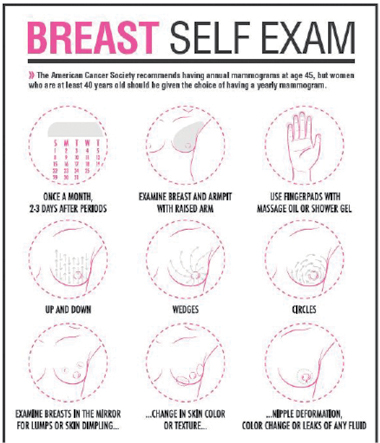Women know about breast self exam but aren’t doing it
Many African women know about breast self-examination (BSE), but few are actually doing it, a new study finds. The paper published in the Nigerian Medical Journal reviewed a total of 28 full-text surveys on breast self-examination across 15 African countries published between January 2009 and January 2019. “The overall picture from this literature review shows […]

Many African women know about breast self-examination (BSE), but few are actually doing it, a new study finds.
The paper published in the Nigerian Medical Journal reviewed a total of 28 full-text surveys on breast self-examination across 15 African countries published between January 2009 and January 2019.
“The overall picture from this literature review shows that the level of awareness about BSE among women from studies in different African countries is relatively high; however, the level of practice is low, even among health workers in some of the studies,” paper author Ofonime Johnson concluded.
Seven of the surveys were conducted in Nigeria, three in Ethiopia, Ghana and Cameroon and two in Egypt. Ten others were included from South Africa, Botswana, Uganda, Tanzania, Senegal, Eritrea, Rwanda, Sudan, Morocco, and Zambia.
“Majority of the reviewed studies showed adequate awareness, mainly from the media, but the poor practice of BSE among women in various countries in Africa. A major barrier identified was inadequate knowledge of BSE technique,” wrote Johnson.
BSE involves visualization and palpation of the breast by oneself for lumps, shape, texture, size, and contour. The purpose of BSE is for a woman to be able to identify changes in the breasts should they exist.
It is carried out once monthly between day 7 and 10 of the menstrual cycle and has a positive effect on the early detection of breast cancer.
About 80% of breast cancers not detected by mammography are detected by women themselves, though most often not as a part of a systematic regular self-examination, but as a part of daily activities such as showering and dressing.
BSE is regarded as a valuable screening tool for breast cancer when used as an adjunct to CBE and mammography.
Furthermore, it can be utilized in enhancing breast cancer awareness among women. BSE is recommended because it is inexpensive, private, painless, easy, and safe and requires no special equipment.
It has also been shown to improve breast health awareness and thus potentially allow for the early detection of breast anomalies.
While screening programs with mammography have been effective in high-income countries, research has shown that other strategies such as BSE are equally important in reducing mortality from breast cancer, particularly in low-resource settings.
“Since a major reason stated for low practice was lack of knowledge and skill on how to perform BSE, in addition to awareness programmes, educational interventions which teach the step-by-step practice of BSE is necessary to increase the practice of BSE in Africa,” Johnson concluded.
Courtesy: NMJ
